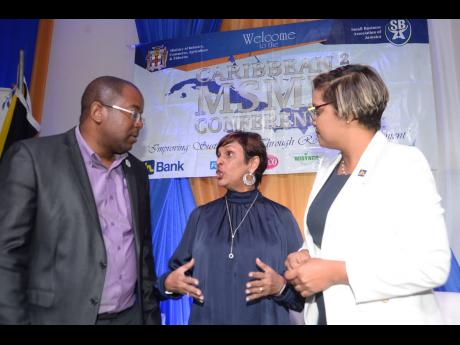MSMEs can reduce climate change effects by innovating
Energy expert and academic Dr Ruth Potopsingh says several of the country’s micro, small and medium enterprises (MSMEs) face enormous risks from climate change, which need to be carefully managed using technology and innovation to mitigate or adapt.
The MSME sector accounts for 35.9 per cent of jobs in the employed labour force, according to the Planning Institute of Jamaica, which means that any significant action in the sector could have widespread consequences for the economy.
Addressing a breakout session on ‘Operationalizing Innovative Initiatives’ at the Caribbean MSME Conference 2019 at The Jamaica Pegasus hotel on April 16, Potopsingh outlined that among the risks many businesses face is significant financial losses if they are struck by a climatic event as 70 per cent of businesses are the sector operate in high-risk areas and are either not insured or underinsured.
“Climate change is very costly. It’s costly to the national economy, but it’s also costly to your business,” Potopsingh said. “So you need to strategise,” she urged participants.
“I am not too sure about what the insurance status is in Jamaica in terms of taking into consideration climate impacts, but I know you will have flooding and damage in lots of places, so that is something we have to look at as national policy,” she said.
Beyond climatic events, Potopsignh said that businesses need to pay attention to climate change conversations so that they are aware of the policies and measures, that the Government is adopting and implementing that could affect the inputs into their businesses and their operation and production. Climatic activities in other parts of the world could also affect their suppliers and vendors, or even the supply chain, which would subsequently affect their businesses.
“What are the policies that are related to climate change? You need to know what are the environmental requirements and regulations as a result of global warming,” she said. “We are all aware of the initiative to lessen our single-use plastics, so that will impact your business, so you have to plan ahead,” Potopsingh continued.
“If your supplier is in Japan or Thailand and they have a climate event, you need to know if that’s going to impact your raw-material supply or your networks that you connect with,” she advised.
Pandemics stemming from climate change effects could also affect the workforce, she indicated.
Potopsingh said MSMEs’ response to climate change issues will lie in their ability to innovate.
“And innovation does not mean invention,” she cautioned. “The wheel was invented, but people have used it in many ways,” she said, pointing out that while innovation may sometimes result in new products and services, it is simply finding new ways of using existing items and approaches.
HOLISTIC APPROACH
She recommended using technology, such as cloud computing to store business data to mitigate the effects of climatic events and to enable business continuity, as well as to respond to changes. However, she pointed out that a holistic approach to mitigating effects on the business would be to infuse climate change considerations into the business’ products and services, its marketing approach and the it’ processes and model.
“Develop strategic relationships with your suppliers, with your distributors and your customers. These are not the days for people to be operating as a “lone ranger,” even in your small businesses. Teamwork and networking are going to help your business more than you alone trying to keep your business,” Potopsingh advised.
She also mentioned the availability of funding to business persons wanting to “green” their operations, through facilitiesmanaged by the Government.
“Companies that look ahead and who turn detailed climate risk assessments into innovation potentials, combined with sound economic planning, will be far better equipped to face the new risks; changing market place conditions, and policies in a world impacted by climate change,” she concluded.
Summarising the discussions, chair of the session, Onika Miller, managing director of the MCS Group, the non-financial arm of the conference’s main sponsor, the Jamaica National Group, noted that a majority of MSMEs operating in high-risk areas do not believe climate change will have a major impact on their businesses.
“In greening our businesses, we are positively enhancing our resilience,” she said. “Reviewing our business models will also allow us to leverage the opportunities that climate change present, since it is upon us, and it is not going away,” she said.

